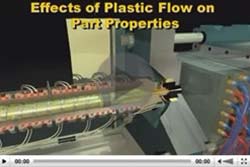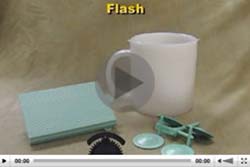Expert Training Courses
Technical Injection Molding - Expert Molder Module
In this 5 lesson training program, learn how the 4 primary plastic processing variables of pressure, temperature, flow rate and cooling rate determine ALL part properties. Learn molding from the “plastic’s point of view” – a breakthrough learning technique literally invented by Paulson Training in the 1970’s. Discover the relationship between cavity pressures and the internal part stresses they create. Mold better parts by applying your increased knowledge of plastic behavior to the molding machine controls. This program builds on the knowledge gained from the Practical Injection Molding - Basic and Optimizing modules. Emphasis of this course is on building an in-depth understanding of the molding process for those wanting to be at the expert molding level.
Injection Molded Part Problems & Solutions
Train production and design personnel to analyze, identify and correct 11 of the most common and costly plastic molded part defects. Having this knowledge spread among your key personnel allows your company to expand problem-solving capabilities and improve quality, dramatically reduce reject rates and maximize profits through efficient, defect-free scientific molding techniques. Each part defect is described and analyzed to show how it develops - from the "plastic's point of view". The machine control adjustments, tooling and part design changes necessary to correct specific part defects are explained in detail. Also taught is the cause and effect method of problem analysis - a very valuable technique for analyzing and solving all types of production and management problems. Target audience: injection molder technicians, supervisors, set-up personnel, troubleshooters, mold designers and part designers.
Implementing Decoupled Molding
This training program was developed in cooperation with RJG and combines the teaching quality of Paulson with the decoupled molding technical expertise of RJG's best engineers. Decoupled molding is a system of molding techniques designed to achieve a high level of accuracy and repeatability in the molding process even as molding conditions like viscosity naturally vary. Learn how to establish a methodology for setting up a decoupled molding process and how to read and understand critical pressure charts to identify problem areas and take corrective action. This training course will improve process consistency by separating (decoupling) the molding process into three phases: filling, packing and cooling. Topics include pressure transducer specifying and installation in the cavity, reading and interpreting pressure charts from molding cycles, specific molding techniques that produce consistent part properties, and determining the present capabilities of your molding machines and how to "tune" them for maximum performance.





